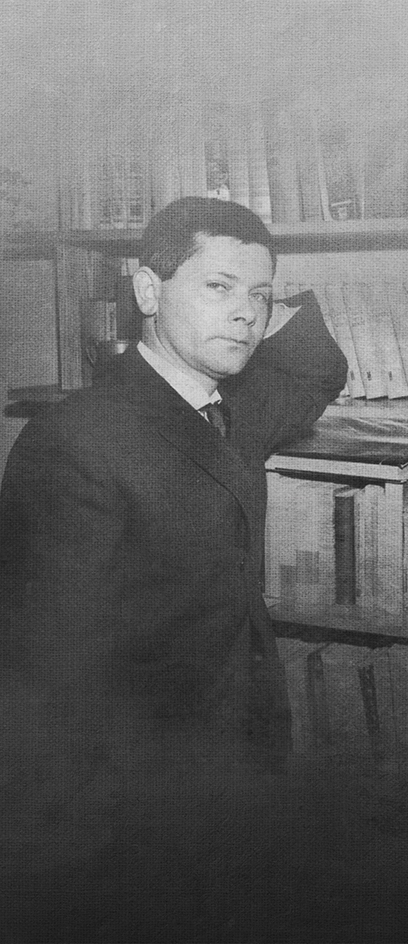
Zbigniew Herbert
poet, essayist and playwright
(born on 29.10.1924 in Lviv, died on 07.28.1998 in Warsaw)
Throughout its history, each country only has a few poets whose words become the property of the language handed down from generation to generation. That happened with poetry of Herbert in his lifetime. - Czesław Miłosz about Zbigniew Herbert
There is no doubt that Zbigniew Herbert is one of the most outstanding Polish contemporary poets - with huge achievements, extraordinary moral authority and creative, as well as extraordinary resume, dramatically entangled in history.
The poet was born in Lviv. He came from a family with British roots - hence the unusual for a Pole name. Herbert was not associated with writing for long. After the war he studied law and economy in Krakow and Toruń. In 1951 he moved to the University of Warsaw, where he intended to study philosophy.
Herbert's difficult life in the capital (in the years 1952 to 1957 he lived at Wiejska street, sharing a room with twelve people), prompted him to reach for the pen - initially more for economic reasons than because of his artistic aspirations. He made his debut in 1950 in the weekly Dziś i jutro, with which he collaborated for several years, publishing poems under names such as Patryk or Stefan Martha. In time, he established contacts with other magazines - including Tygodnik Powszechny and the monthly Poezja. In 1956 he released his debut book of poems entitled String of light.
Despite unprecedented artistic craftsmanship, Herbert did not achieve the status of national poet. He was cut off from the conventions imposed by the socialist realism, wrote unpopular poems, and because of the moralizing tone, was considered too controversial to the then government. Much of his work found its way into a drawer, waiting for better times. The poet was forced to moonlight in various ways, taking on simple and low-paid work.
The sixties is a stage of Herbert's Mediterranean fascination. Using the momentary political thaw, he obtained permission to travel abroad, when he visited, among others, Italy and Greece. He also travelled through other European countries (including Germany, France, the Netherlands, England) and the United States. Inspired by his expeditions, he released more volumes of essays (including Barbarian in the Garden) and poems (e.g. Study of the Object). In the US translations of Herbert works were published, making him one of the most popular contemporary poets in English language.
Despite his long-term stays abroad, Herbert did not give up on Poland. On the contrary, he was heavily involved in opposition activities. In 1974 he was a signatory of the Letter 15, demanding access to Polish culture for Poles living in the USSR. A year he later signed Memorandum 59, opposing the authoritarian changes in the Polish constitution.
The seventies were also a period in which Herbert created his greatest work - the poem The Message of Mr. Cogito (1974), a sort of anthem of the opposition movement. The character of Mr. Cogito - a man of grey, the reader of newspapers and frequenter of dirty suburbs, while being an individual who is extremely conscious and unyielding to the grim reality - became the hero of the whole series of works. Cogito (sometimes identified with Herbert himself) promoted a steadfast attitude, contrary to all opportunism.
In the eighties, Herbert focused mainly on underground publishing. He published in this way, among others, a famous collection of poems Report from the Besieged City, referring to the martial law happening in Poland at the time. In 1986 the poet moved to Paris, where he spent five years. Ailing, he returned to Warsaw in 1991. Despite the worsening symptoms of asthma, he was writing until the end of his days. The volume Epilogue of the Storm appeared a few months before his death in 1998. The grave of the poet is at the Powązki Cemetery.
Do you know?
- During World War II Herbert worked as a lice feeder in the institute producing vaccines against typhoid fever.
- In the fifties, Herbert worked part-time as a timekeeper and a paid blood donor.
- At the early stage of his work as a poet he also wrote dramas. Some of them have been adapted for the needs of radio plays.
- Zbigniew Herbert was a close friend of the Polish Nobel Prize winner Czesław Miłosz.
- Before his death, the poet openly criticized the process of political transformation in Poland, recognizing the reforms as too mild and a trade-off.
- Herbert was posthumously awarded the Order of the White Eagle - the most important Polish state distinction.
- The year 2008 was declared A Year of Zbigniew Herbert by the Polish Sejm. On this occasion, a series of cultural events were organized, and the National Bank of Poland issued a coin with the image of the poet.






